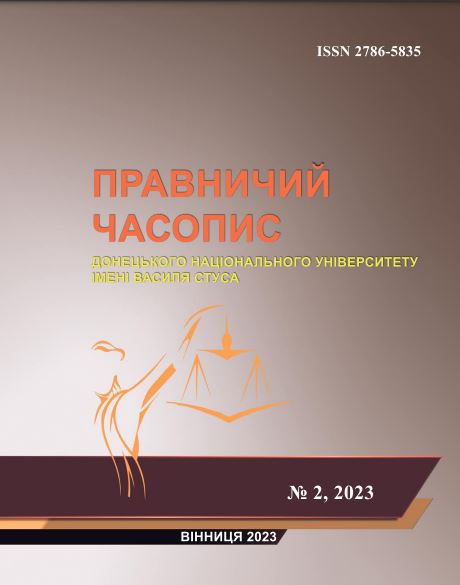Criteria for Restrictions on The Constitutional Right to Freedom of Movement
DOI:
https://doi.org/10.31558/2786-5835.2023.2.2Keywords:
human rights; freedom; freedom of movement; constitutional system; Constitution; restriction of rightsAbstract
The article examines the key generally accepted criteria for the implementation of restrictions on the right to freedom of movement. The author formulates a scientific problem, which consists in the fact that the armed conflict and the need to ensure national security and border protection force the authorities to apply unpopular measures to restrict freedom of movement which results in complex and ambiguous reactions from the legal consciousness of the population. The article classifies restrictions on the right to freedom of movement according to the territorial and individual principle.
The author summarizes specific criteria that are requirements for the state when implementing restrictions on freedom of movement: legality, proportionality, protection of greater or equal value, necessity in a democratic society, inadmissibility of distortion of law (restriction of freedom of movement must be temporary, does not mean its cancellation and be appropriate in a specific situation). The criterion of necessity in a democratic society is quite complex so it has to be substantiated separately by different courts. It is extremely important when setting restrictions to justify the proportionality of the goal and measures. During martial law, the state is endowed with a considerable number of tools for restricting human rights but this does not mean that it must use all of them at the same time. Each aspect of the restriction of the right to freedom of movement must have a justified purpose.
An important principle is that restrictions should not violate the essence of the right, that is, their introduction should not have the effect of canceling the right and rights in particular. Restrictions should exist to preserve rights, not vice versa. For this purpose, special cases of their application, such as martial law, are provided for.
The criterion of the legality of restrictions is not enough, there must be a legitimate purpose, which is expressed in the implementation of the principle of proportionality that is the compliance of restrictive measures with the declared legitimate purpose. An equally important criterion is the necessity in a democratic society because totalitarian regimes do not know the problems with the legalization of any restrictions on human rights.
In the article, the author concludes that the protection of rights and democratic order is a goal for limiting the right to freedom of movement, but it is also a problem at the same time, since there is a shaky balance between the state’s capabilities on the one hand and the freedom of the individual on the other. The implementation of restrictions on freedom of movement cannot be automatic, but only justified by its degree in specific circumstances.
References
Конституція України від 28.06.1996 № 254к/96-ВР. URL: https://zakon.rada.gov.ua/laws/show/254%D0%BA/96-%D0%B2%D1%80#Text
Про свободу пересування та вільний вибір місця проживання в Україні: Закон України 1382-IV. Редакція від 10.10.2022. URL: https://zakon.rada.gov.ua/laws/show/1382-15#Text
Яблуновська К. М. Обмеження свободи пересування та вільного вибору місця проживання громадян України. Науковий вісник Міжнародного гуманітарного університету. Сер.: Юриспруденція. 2019 № 41 Том 1. С. 125–128.
Brezger J. Internationale Freizügigkeit als Menschenrecht, Campus Verlag Frankfurt. New York, 2018. 261 s.
Кучів О. Обмеження свободи пересування у світлі необхідності в демократичному суспільстві: підходи ЄСПЛ. Слово Національної школи суддів України. 2021 №2(35) С. 27–39.
Nikiforenko v. Ukraine, no. 14613/03: European Court of Human Rights, 18 February 2010. URL: http://hudoc.echr.coe.int/eng?i=001-97356
Продивус С. В. Правомірне обмеження права на свободу пересування: міжнародно-правові стандарти та практика Європейського суду з прав людини. Науковий вісник Ужгородського національного університету. Серія: Право.2023 Т.2, № 78. С. 365–371.
CCPR General Comment №27: Article 12 (Freedom of Movement) Adopted at the Sixty-seventh session of the Human Rights Committee, on 2 November 1999 CCPR/C/21/Rev.1/Add.9, General Comment No 27. (General Comments) (Contained in document CCPR/C/21/Rev.1/Add.9) URL: https://www.refworld.org/pdfid/45139c394.pdf

